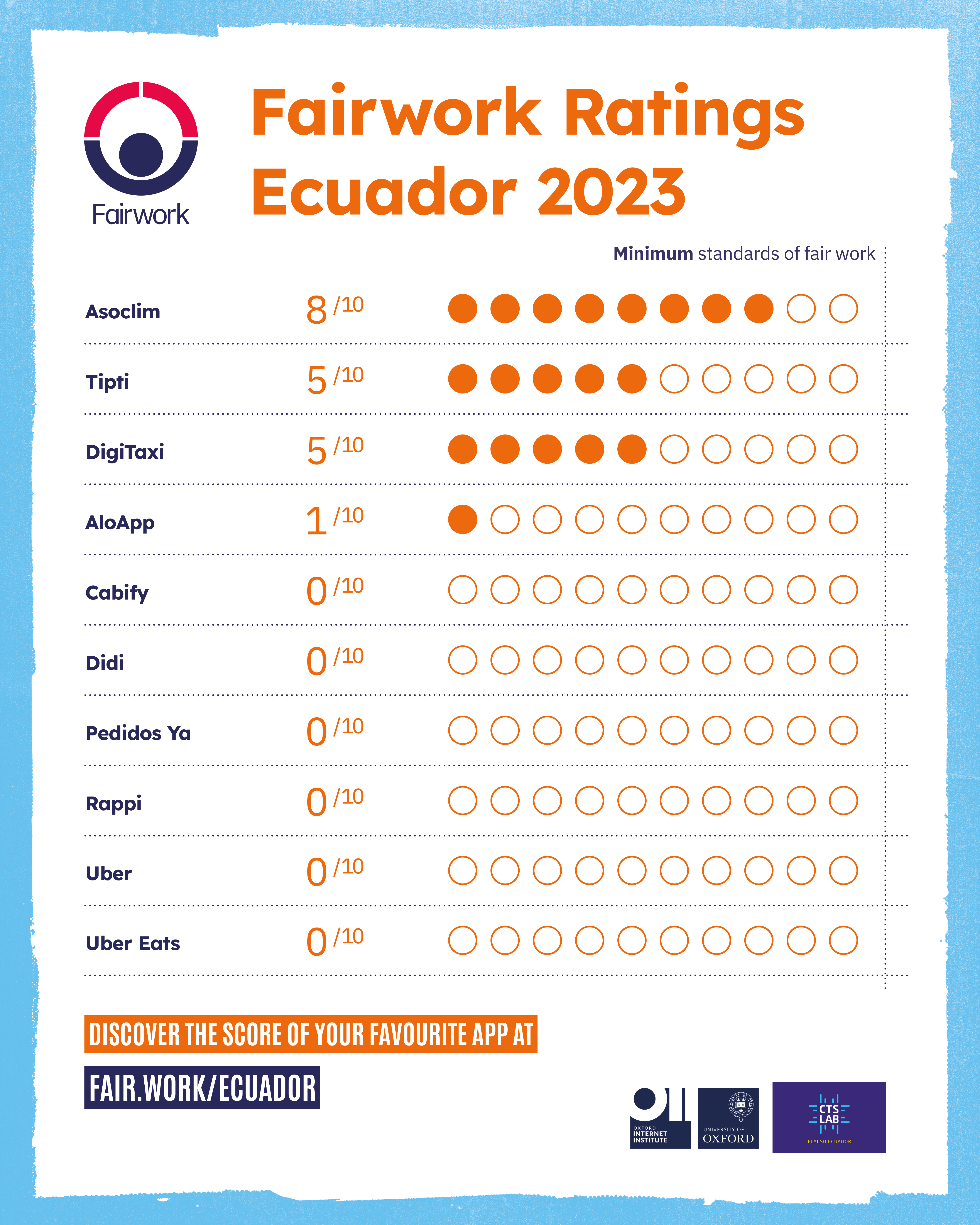Local platforms and cooperative models demonstrate better working conditions than multinationals such as Rappi, Uber or Cabify, according to a new report by FLACSO Ecuador

The ‘Fairwork Ecuador Ratings 2023: Platform Hybrid Models‘ report examines for the third year in a row the working conditions in 10 delivery, transport and domestic service platforms based on five fair work principles.
The last year has been marked by the debate on the regulation of platform work and the departure of one of the largest international companies in the sector from the country. At the same time, the report points to increased experimentation and innovation in platform business models in Ecuador, such as cooperative models or models created in cooperation with trade unions.
Ratings
For the second year in a row, local companies lead the fair labour ranking. The domestic services platform Asoclim stands out in particular, with the highest score to date in Ecuador (8 out of 10). Asoclim is a cooperative created by members of the Unión Nacional de Trabajadoras Remuneradas del Hogar y Afines, whose workers are paid above the minimum wage and receive social security and access to various courses. In contrast, six international platforms assessed (Cabify, Didi, Rappi, Uber, Uber Eats and PedidosYa) could not evidence any parameters of fair work.

Key findings
Fair pay: Only 2 out of 10 companies assessed, Tipti and Asoclim, demonstrated that their workers receive at least the minimum wage (450 USD/month) after deducting work-related expenses such as fuel or vehicle maintenance. But none could demonstrate that they offer a living wage (USD 767).
Fair conditions: Only 3 platforms, Asoclim, Digitaxi and Tipti, could demonstrate that they offer measures to protect against work-related risks such as theft or accidents.
Fair contracts: Only 3 platforms, Asoclim, Tipti and Digitaxi, were able to demonstrate that they have clear and transparent terms and conditions, and that they operate under Ecuadorian law.
Fair management: Asoclim and Tipti are the only platforms that evidenced policies to provide due process for workers who are deactivated or dismissed by the application and offer measures to promote equal opportunities.
Fair representation: Asoclim and Digitaxi were able to demonstrate that they provide fair worker representation by both operating cooperative-based models.
The report’s findings point to the benefits of more democratic business models in which workers have a voice. Platforms with cooperative models such as Asoclim or Digitaxi were able to demonstrate fairer conditions. For example, these two platforms offer fairer management by not using their algorithms to monitor or penalise workers. Still, these platforms remain subject to market and competitive pressures. Regulation of the sector may offer an opportunity to level the playing field and ensure basic guarantees for platform workers.
María Belén Albornoz, professor at FLACSO Ecuador and lead researcher at Fairwork Ecuador comments: “The era of naïve novelty and disruption of gig economy platforms is coming to an end. The problems and side effects of the unregulated operation of these platforms, as well as the opportunities and advantages they offer, are becoming increasingly evident. Fairwork Ecuador advocates for finding common ground, including a basic set of labour standards that will allow all actors to take equal advantage of the benefits offered by these new socio-technical configurations”.
What can I do? Fairwork Pledge
As part of Fairwork’s commitment to making platforms accountable for their labour practices, we have launched the Fairwork Pledge. This pledge aims to encourage other organisations to support decent labour practices in the platform economy, guided by the five principles of fair work.
Organisations like universities, schools, businesses, investors and charities that make use of platform labour can make a difference by supporting platforms that offer better working conditions.
Organisations have the option to sign up to the Pledge as an official Fairwork Supporter or an official Fairwork Partner. Those signing up to be a Supporter must demonstrate their support for fairer platform work publicly and provide their staff with appropriate resources to make informed decisions about what platforms to use. Becoming a Fairwork Partner entails making a public commitment to implement changes in their own internal practices, such as committing to using better-rated platforms when there is a choice.
More than 40 organizations, including GIZ, Solidarity Center, Learning Lions, WZB Berlin Social Science Center, and FES, have already signed the pledge. Join them in demanding a fairer future of work!